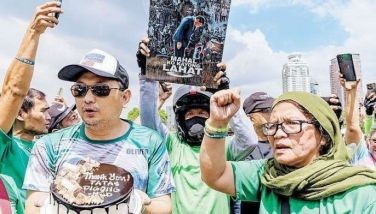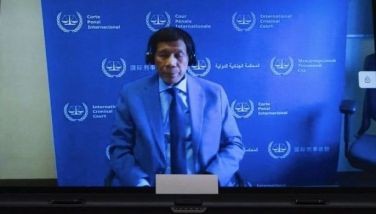Duterte’s 2nd bout with dirty miners

President Rody Duterte’s second State of the Nation reviewed not his first year’s accomplishments but shortcomings. Still, from their televised reactions, various reformists were pleased.
Loudest to clap were the environmentalists. Duterte had lashed out at dirty mines that pollute farms and seaside, “the protein source for the day” of subsistence farmers and fishermen. The impoverished victims are archipelago-wide. If miners irresponsibly fail to restore rivers and forests to life, he would “tax them to death,” the President warned.
Duterte attributed his awakening to Ted Failon’s recent ABS-CBN tele-docu. (Congratulations, Ted, take a bow). He remarked too how right had been Gina Lopez, his short-stint environment secretary whose nomination lawmaker-miners had rejected.
Duterte cited the Mount Diwalwal gold rush site in Compostela, eastern Mindanao. There the river is pristine at the source, but only a kilometer away where dozens of processing backyards are the water is black. (I’ve been there thrice and saw it myself.) In cement open ponds, banned acid and mercury are used to separate the gold from the rocks. The poison is ejected to the river, which with mud from tunnels cascades to the rice and fruit plantations below and onto the sea. From the hillside, the sea view is brown for many kilometers away, until it mixes with the blue Pacific. No fish to be caught there; the corals long have choked to death. From dawn to dusk around the hills can be heard dynamite blasts by tunnel diggers. The stench in the air is permanent. Diwalwal is no wilderness; half a million people have been living there since the 1980s.
In the mountains of Agusan to the north is SR Metals. There the nickel mine of a Liberal Party financier and a congressman does its own damage. Starting as small-scale in the mid-1990s, they unilaterally reinterpreted their mining limit of 100,000 tons of rock ore a year to 100,000 tons of processed nickel. Thus they ravaged not only their small concession but an entire mountain range – until the Supreme Court fined and closed them down in 2008. Two years later during the Presidency of LP chairman Noynoy Aquino they reopened as a large-scale mine. Not only did they illegally get such new license despite their dark past, Aquino even awarded them as exemplary miners. That farce goes on to this day.
In Zambales, Luzon, facing the West Philippine Sea, the townsfolk of Masinloc, Sta. Cruz, and Candelaria suffer as well from nickel mining. In just one day in July 2011 the LP governor signed away 94 small-scale mining permits. Most were outside the sites earlier approved by the provincial mining regulatory board. Five of the small miners sold their rights to three giant Chinese firms. Instead of just picks, shovels, and wheelbarrows, the Chinese miners fielded 3,500 excavators, bulldozers, and dump trucks. Large segments of the Caraballo Mountain Range were leveled for ore that was shipped out to China with no records shown or taxes paid. At one point four giant vessels would sail off per week. In China the nickel was processed for its steel and electronic industries, later for use in warships, weapons, and spyware to grab Scarborough Shoal (Bajo de Masinloc) from the Philippines. With their forests and rivers gone, their farmlands flooded and seas muddied, and air dirtied, the townsfolk became sick. For a year the health department declared the area worst in lung disease from dust and diesel emission (see http://www.philstar.com/opinion/2013/07/29/1025811/zambales-ruling-means-protection-against-chinese-miners-elsewhere). The Supreme Court stopped the Chinese miners in 2013, but three Filipino firms continued the destruction.
Duterte said in the State of the Nation that “anti-mining” Speaker Pantaleon Alvarez Jr. would ensure the enactment of sterner mining laws. Interviewed the next day by DZBB’s Ali Sotto and Arnold Clavio, Alvarez said he is particularly peeved with influential persons who are able to obtain mining permits then sell to dirty miners.
* * *
Jubilant as well are health activists. Duterte finally might untie the deadlock over the Reproductive Health Law at the Supreme Court.
Duterte had chided the High Tribunal for the indefinite injunction against the RH Law. Millions of families in need of safe contraceptives remain unaided as billions of pesos in government medicines expire due to the two-year-long delay in the case resolution. Anti-RH lawyers had claimed that the law promotes unconstitutional abortion. Doctors counter that it doesn't, and are raring to argue so. But the High Court has not scheduled deliberations on the merits, as unnamed Catholic justices prevent it. Duterte insinuated that the delay could mean the anti-RH side is weak in law.
* * *
Catch Sapol radio show, Saturdays, 8-10 a.m., DWIZ (882-AM).
Gotcha archives on Facebook: https://www.facebook.com/pages/Jarius-Bondoc/1376602159218459, or The STAR website http://www.philstar.com/author/Jarius%20Bondoc/GOTCHA
- Latest
- Trending





























